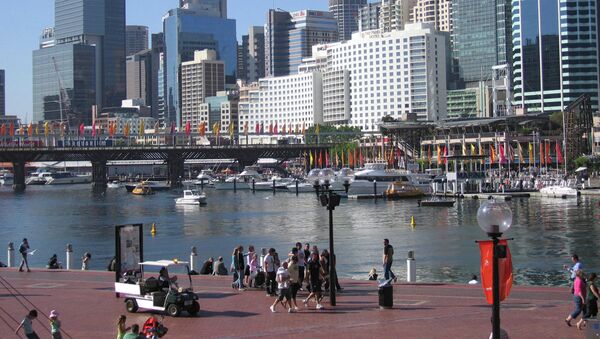MOSCOW, October 2 (RIA Novosti) — Australia has raised its threat level to high and undertaken a series of high-profile security initiatives, including proposing a law which would sentence anyone disclosing information about "special intelligence operations" to a decade in prison.
Michael McKinley, a Visiting Research Fellow from Australia's National University says the country’s top officials are afraid of threats similar to those posed by the 9/11 bombers.
McKinney isn’t particularly concerned about people leaving Australia to fight for IS, although they are problematic, he says. However, there is a fear of home-grown terrorists, people who in small groups decide without any external guidance to carry out their own operations, as happened with the London bombers.
“This is a season in Australia for the finals of the various types of football — Rugby Union, Rugby League are having their grand finals, and last week the Australian Rules Football,” he told Radio VR. These, he says, require huge security operations associated with them. The fear is that there would be an ideal place for someone to commit mayhem.” He says there are precedents in Britain where a plot was uncovered which would have otherwise resulted in a terrorist strike at an English football match. This, he says, is where the apprehension is more than just about the risks posed by average people.
McKinley also commented on Australia’s decision, voiced by Prime Minister Tony Abbot on Wednesday, to provide its aircraft to fight the Islamic State in Iraq.
“It has very little to do with peacekeeping, peace enforcing and peace observation missions that Australia has been involved in in the past,” he said. “This is very much an initiative for the operational commitment which is being determined by Australia’s alliance with the US. If the US was not going into Iraq and Syria, then Australia would not be part of any operation, which is very much alliance-determined.”
The government in Australia is very relieved that President Obama has said he was not going to put soldiers on the ground, McKinley said.
“The problem is that most strategists would say that unless you put feet and boots on the ground that are reliable and professional, the bombing is not going to achieve an end.”
He furthermore explained that there is a reluctance in Australia to send soldiers to the Middle East, there are some special forces there numbering a maximum of 200 at this stage. Whether they would be openly committed to operations against IS remains to be seen, he added.
McKinley said that the question that was never answered openly or explicitly by the Prime Minister was whether or not the US has asked Australia for a contribution or whether Australia had offered to contribute, as it has done in the past.
If precedent is the determining factor, he explained, then Australia would have offered. However, it doubtlessly would have been dressed up as the diplomats say, as a “form of words”, which would be sufficiently ambiguous, and could be interpreted either way.

